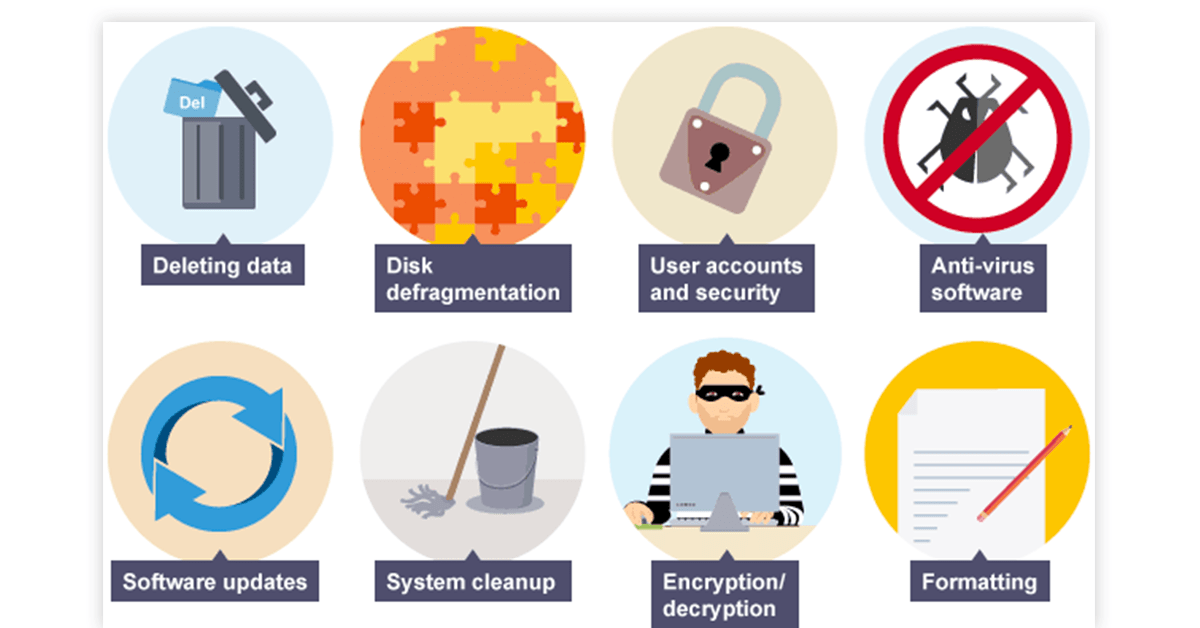Summary: Has it ever crossed your mind how your system performs certain tasks without any lag? It is because the utility software works in the background to make it happen. This helps with system efficiency and smooth performance.
To run any software and work on different programs, on a computer system, one needs the operating system to work smoothly. Utility programs, as the name suggests not only help in executing various crucial tasks for the operating system but also help in overall maintenance of the system.
What is a Utility Program?
The utility program is a system software or application that executes a specific task, generally pertaining to optimal maintenance or operation of the system resources. Operating systems such as Windows, macOS, and Linux come with their own set of programs to maintain and execute different utility functions such as formatting, compressing, scanning, exploring, and more.
In other words, Utility-program definition in simple terms is that it assists with the management of computer functions, resources, and files. You can ensure complete password protection and keep your systems virus-free using different utility programs.
What are the Functions of Utility Programs?

Various functions are executed by a utility program to make the system’s operations smoother and more efficient. Overall, they can be broadly categorized into four parts:
System Utilities
Some of the system utility programs are memory manager, antivirus and firewall, registry checker and cleaner, package installer, and explorer. Also, with the help of such system in computers, users can execute functions that are crucial for the smooth running of an operating system.
File Management Utilities
File management utilities include tools such as data archivers, software backup tools, file compression tools, and managers. With the help of these, users can manage their data in the form of files and folders. These utilities help users sort out, store, and categorize files according to their requirements.
Storage Device Management Utilities
Storage device management utility programs provide solutions for enhancing disk capacity, such as disk clean-up, partition management, formatting, disk space allocation, defragmentation, etc. With the help of them, users can compartmentalize systems and external drives for efficient management of programs and files that are stored within.
Miscellaneous Utilities
Apart from these three utility program categories, various other programs help in managing business operations. Some of these programs include data generators, HTML checkers, and hex editors, to name a few.
Advantages of Utility Program
Let’s check out the different advantages of utility program that can be beneficial for its users.
- Efficiently manage your data and files with proper storage
- Remove unnecessary files to ensure that you always have storage space for new applications and programs
- Enhance your system’s security by protecting it from malicious virus threats and attacks
- Easily and quickly locate and access your files and folders in the system with the interface customization feature of the utility program
- Find your lost files and folders with file recovery software and recover any data loss
- Enhance your system’s performance by creating space and efficiently managing system storage
Disadvantages of the Utility Program
After knowing the advantages of a Utility program, it becomes necessary to get familiar with some of its disadvantages too. Here are some drawbacks of utility programs. Let’s check them out:
- System Instability: Certain utility programs sometimes alter a computer’s system settings, leading to potential system instability or incompatibility issues with other software applications.
- False Positives: Antivirus programs often produce false positives. This leads to wrong flagging of legitimate software applications as security threats and causing unnecessary disruptions.
- Resource Consumption: Sometimes consume system resources like CPU and memory, impacting system performance and user experience.
- Compatibility Issues: Some utility programs are not compatible with specific operating systems or hardware configurations, resulting in compatibility concerns.
- Cost: While many applications are accessible for free or at low costs, specialized utility programs are expensive. This contributes to the overall cost of managing and maintaining a computer system.
- User Error: Improper use or configuration of utility program can lead to data loss, system instability, or other major consequences.
Common Tasks Performed by Utility Programs
As discussed earlier, utility applications help in executing some of the most basic yet important functions in the operating system. Some of these basic yet crucial programs are:
Disk Defragmentation
Defragmentation is a process which helps reduce the amount of fragmentation in file systems. Utility programs function by organizing the disk content and storing the pieces of each file together. It also helps create large amount of free space using compaction to impede the return of fragmentation. This happens when any operating system is unable to allocate space for storage as single unit.
Disk Clean-up
With the help of utility program on the computer, users can remove the unnecessary files that are taking up the space in their system. The program assists users in choosing the drives, folders, or files that need to be scanned and cleaned up. By removing unused files, the system will be able to increase the storage space and optimize the overall speed of the system.
File Management
With the help of a file management program, users can perform various functions related to the files saved in the system, such as searching, renaming, opening, renaming deleting, and grouping. These functions can be executed with the help of file management programs such as Windows Explorer. In addition, Windows also help in keeping track of the root and the path of a file.
Compression
One of the biggest concerns of any computer system is its storage space. With time, the limited storage space in the hard disk starts getting smaller. Therefore, with the help of compression programs such as WinZip and WinRAR, important yet unused files can be compressed, stored, and easily extracted when required.
Disk Management
Disk Management is one of the most vital programs that an operating system like Windows provides. With the help of the system utility software and program, users can seamlessly manage various drives such as hard drives, optical drives, flash drives, etc. It helps users partition drives, allocate spaces, format drives, and much more.
Antivirus and Firewall
Antivirus and firewall programs such as Windows Defender help users protect their computers from getting infected with viruses, adware, and malware. Firewalls prevent harmful programs and files from entering the system via the Internet or any external hardware. On the other hand, antivirus helps in removing malicious programs and files that have infected the system.
Types of Utility Programs
Various types of utility programs are commonly used, including:
- Antivirus programs: These helps identify and remove viruses, malware, and other harmful software from a computer system.
- Disk cleaning tools: These types of utility programs help scan a computer’s hard drive for redundant files and other data that can be safely deleted to create additional storage space.
- Backup and recovery applications: This type of utility program enables users to generate duplicates of their data and restore it in case of data loss or system malfunction.
- System optimization software: These helps boost a computer’s performance by fine-tuning system settings, eliminating unnecessary files and programs, and administering system resources efficiently.
- Disk defragmentation utilities: These programs are designed to improve a computer’s hard drive to enhance file access speed and overall system performance.
- File compression programs: File compression software helps compact files and folders to conserve storage space and facilitate easier transfer over the internet.
- Disk encryption applications: Disk encryption software encrypts data on a computer’s hard drive to safeguard it from unauthorized access.
Why Need Utility Program?
There are different functions served by the Utility program. Some of them are system maintenance, efficiency, security, data recovery, and user experience. Let’s read about them in detail below:
- System Maintenance: It encompasses a diverse set of tools and applications that help users manage and uphold their computer systems, enabling them to enhance system performance. This helps eliminate unnecessary files and programs and ensures the smooth operation of their system.
- Security: Integrates tools like antivirus and encryption software to enable users to shield their computer systems from security risks or threats like viruses, malware, and unauthorized access.
- Efficiency: Utility software helps optimize system performance, streamlining routine tasks such as disk cleanup, file compression, and data backup. This in turn reduces the time and effort required to perform routine tasks.
- Data Recovery: Backup and recovery tools of utility programs assist users in retrieving lost or deleted data in the event of system failure or data loss.
- User Experience: Utility software enables users to customize their system settings and preferences, enhancing their overall user experience.
Conclusion
Most of the utility programs in computers come as a part of the operating system’s package, however, users can download third-party software solutions for specific functions. Utility software programs such as disk cleaners and antiviruses are available with extra features that are sold separately. For purchasing these utility programs, visit our products section.
FAQs on Utility Program
What is utility program and example?
A utility program is an application that performs tasks related to computer management such as virus protection, password management, file compression, etc. Antivirus software, compression tools, file management systems, etc., are some common examples of utility programs.
What is a utility program on a computer?
A utility program on a computer is software that helps maintain a computer device. Users can optimize, configure, and analyze their computer functions with a utility program.
Is a utility program a system software?
Utility software is one of the types of system software. Utility software focuses on how the hardware, software, & operating system in a computer works.
What is the difference between utility software and system software?
Utility software helps your computers and systems to perform better. On the other hand, system software is a general-purpose system that provides a path for your application to run.
Summary
Most of the utility program in computer come as a part of the operating system’s package, however, users can download third-party software solutions for specific functions. Utility software programs such as disk cleaners and antiviruses are available with extra features are sold separately. For purchasing these utility programs, visit our products section.
Also, check What is Utility Software? Top Utility Software Tools
Anurag Vats is an in-house technical content writer at Techjockey who is fond of exploring the latest avenues in the field of technology and gadgets. An avid reader of fiction and poetry, he also likes to dabble with brushes and poetry and loves to cook in borrowed kitchens.... Read more



























